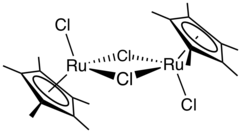Pentamethylcyclopentadienyl ruthenium dichloride dimer
Pentamethylcyclopentadienyl ruthenium dichloride is an organoruthenium chemistry with the formula [(C5(CH3)5)RuCl2]2, commonly abbreviated [Cp*RuCl2]2. This brown paramagnetic solid is a reagent in organometallic chemistry. It is an unusual example of a compound that exists as isomers that differ in the intermetallic separation, a difference that is manifested in a number of physical properties.
 | |
| Names | |
|---|---|
| IUPAC name
Di-μ-chlorido-bis[chlorido(pentamethyl-η5-cyclopentadienyl)ruthenium(III)] | |
| Other names
Di-μ-chloro-bis[chloro(pentamethylcyclopentadienyl)ruthenium(III)] Dichloro(pentamethylcyclopentadienyl)ruthenium(III) | |
| Identifiers | |
3D model (JSmol) |
|
PubChem CID |
|
| |
| |
| Properties | |
| C20H30Cl4Ru2 | |
| Appearance | brown solid |
Except where otherwise noted, data are given for materials in their standard state (at 25 °C [77 °F], 100 kPa). | |
| Infobox references | |
Preparation, structure, reactions
The compound has C2h symmetry, with each metal atom having pseudo-octahedral geometry. In the crystal structure, two isomers are observed in the unit cell, one with a 2.93 Å ruthenium–ruthenium bond and the other with a long internuclear distance of 3.75 Å. The former isomer is diamagnetic, and the latter is magnetic.[1][2]
It is prepared by the reaction of hydrated ruthenium trichloride with pentamethylcyclopentadiene.[3]
- 2 Cp*H + 2 RuCl3·3H2O → [Cp*RuCl2]2 + 2 HCl + 6 H2O
The reaction is accompanied by formation of decamethylruthenocene.
Pentamethylcyclopentadienyl ruthenium dichloride can reduced to the diamagnetic tetramer of Ru(II):
- 2 [Cp*RuCl2]2 + 2 Zn → [Cp*RuCl]4 + 2 ZnCl2
Methoxide also can be used to produce a related diruthenium(II) derivative, which is also diamagnetic:
- [Cp*RuCl2]2 + 3 NaOCH3 + HOCH3 → [Cp*RuOCH3]2] + 3 NaCl + CH2O + HCl
See also
- (Cymene)ruthenium dichloride dimer - [(cymene)RuCl2]2
- Pentamethylcyclopentadienyl iridium dichloride dimer - [Cp*IrCl2]2
References
- McGrady, John E. (2000). "[(Cp*RuCl)2(μ-Cl)2]: bond-stretch or spin-state isomerism?". Angewandte Chemie International Edition. 39: 3077–3079. doi:10.1002/1521-3773(20000901)39:17<3077::AID-ANIE3077>3.0.CO;2-B.
- Kölle, Urich; Kossakowski, Janusz; Klaff, Norbert; Wesemann, Lars; Englert, Ulli; Herberich, Gerhard E. (1991). "Dichloro(pentamethylcyclopentadienyl)ruthenium—Novel Dichotomy in a Molecular Structure". Angew. Chem. Int. Ed. Engl. 30 (6): 690–691. doi:10.1002/anie.199106901.
- Kölle, Urich; Kossakowski, Janusz (1992). "Di-μ-Chloro-Bis[(η5-Pentamethylcyclopentadienyl) Chlororuthenium(III)], [Cp*RuCl2]2 and Di-μ-methoxo-Bis(η5-Pentamethylcyclopentadienyl)diruthenium(II), [Cp*RuOMe]2". Inorganic Syntheses. 29: 225–228. doi:10.1002/9780470132609.ch52.